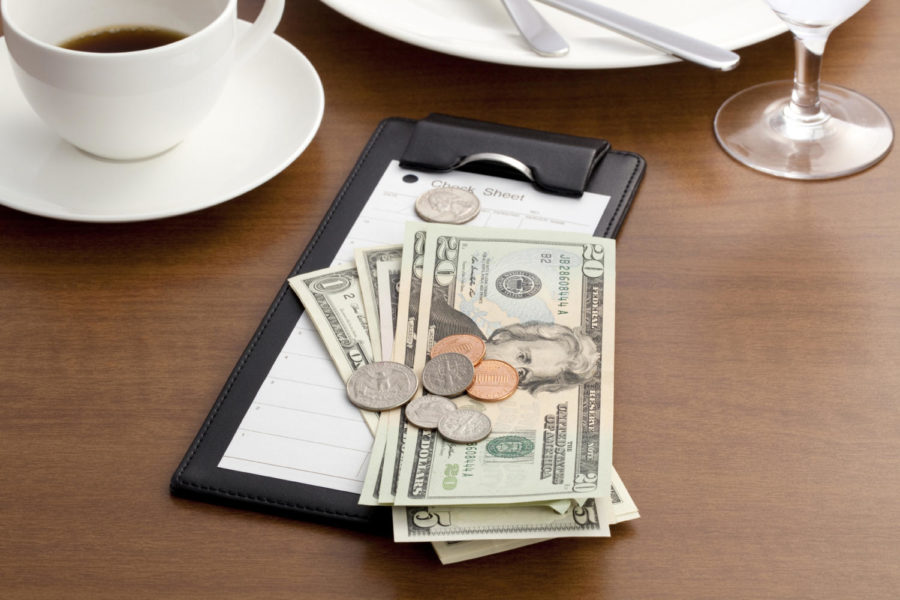Moran: Tipping, gratuity have no place in the restaurant industry
Columnist Moran believes that the United States’ culture of tipping should be dropped and restaurants should begin to pay servers a higher wage.
October 20, 2015
Before I begin, I was planning on writing this column about why gratuity shouldn’t exist in the restaurant business. Now that I’ve done some research, I’m taking it further. I believe that tipping shouldn’t exist at all.
Now, before everyone jumps down my throat and believes I have no idea what I’m talking about, let me explain my reasoning. I worked in a steakhouse for a year and a half and made great tips. But, after doing some research on tipping, I found that tipping is more harmful than beneficial.
One example is the tipping controversy that involved former-Philadelphia Eagles and current-Buffalo Bills running back LeSean McCoy in September 2014. ESPN covered the story, but, to give you a brief summary of the event, McCoy went to a restaurant and left a 20-cent tip. The owner of the restaurant posted a picture of the receipt on Facebook, and it quickly went viral.
McCoy said his 0.32 percent tip was intentionally used to send a message.
“A 20-cent tip is kind of a statement,” McCoy tweeted. “You can’t disrespect somebody and expect them to tip you. I don’t care who the person is. That’s why I left my card so they could see my name.”
So why should celebrities and athletes be scrutinized for something that so many others who are not in the public eye do on a daily basis? They shouldn’t.
Tipping is the right thing to do, but not everyone deserves tips. Not everyone gives good service. I’m much more likely to leave a $15 dollar tip to the server who was friendly and constantly made sure everything was above par than the server who took five minutes to get our drinks and only talked to us when taking our order.
But tipping is unpredictable. An ISU case study researched tipping at restaurants and found that tips were usually dependent on the size of the party, but the biggest tip, percentage-wise, didn’t come from a big table. It came from a table of smokers, who left 71 percent of their bill on a Saturday night. Predicting tips is impossible.
This idea aside, tipping hurts everyone, including the customer.
Sometimes people just don’t have the money to leave a decent tip; other times they just don’t want to. Tipping isn’t a law. You don’t have to do it. But most people do because they feel pressured and don’t want to be seen as a jerk.
Tipping also hurts the server, but most people overlook this idea. The U.S. Department of Labor requires the minimum wage to be $7.25 — unless you’re a server, in which case the minimum wage is $2.13.
With a lower minimum wage, servers rely on tips to achieve a livable wage. But, when controversy arises, most of the people who defend it are servers.
Why are we defending this practice? For every good tipper, there is an equally lousy tipper.
The reason I enjoyed a job as a server in high school was because it gave me money right away. I always had cash in my pocket to spend, and I spent it faster because it was right there.
The current tipping system allows restaurants to underpay their staffs. The idea is to have tips atone for a lower minimum wage. But why do we allow this? Most restaurants would be fine paying their servers minimum wage and raising prices to compensate.
Camino is a restaurant in Oakland, Calif., that has strayed away from the American tipping culture. Instead, it raised prices and has been paying servers a livable wage since July. No problems have arisen, and Camino has been able to raise wages for cooks and bussers.
Ironically, employers in California are required to pay servers $9 per hour before tips, and the National Restaurant Association has projected that California restaurant sales will outgrow a majority of other states in 2015.
Aside from teenagers and college students, why would someone work as a server if they weren’t guaranteed minimum wage? They shouldn’t because it isn’t a steady source of income. Tipping isn’t a manageable source of income for a mother of four children. Instead, it allows teenagers and young adults to have some extra spending money.
Here’s the bottom line — stop tipping.
You may feel like a jerk, and people may get mad, but it only benefits companies and business owners. Servers and customers are left with the short end of the stick.
If we completely remove tipping, it will fall out of fashion and require restaurants to pay their servers a decent minimum wage. Many people would leave the restaurant business for a sustainable job and those who remained would be left to fix the problem.
Just like the our measurement system, America’s tipping culture doesn’t conform to the rest of the world. France and Italy are just a few of the many countries that do not share our tipping culture.
When it comes down to it, tipping does more harm than good. It’s time to abolish tipping and to start paying our servers a decent wage.

















